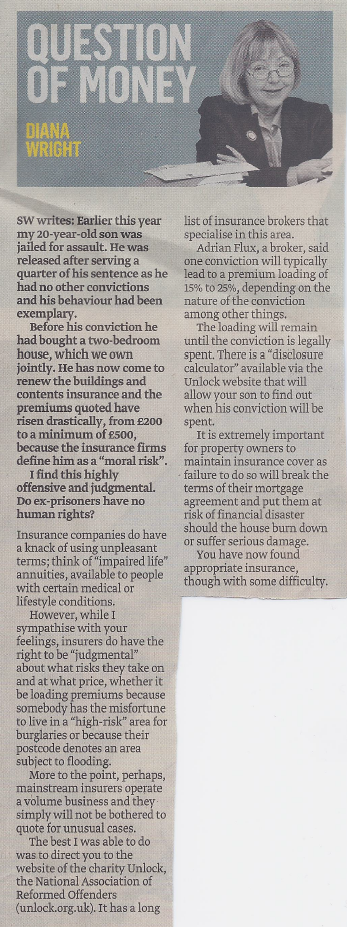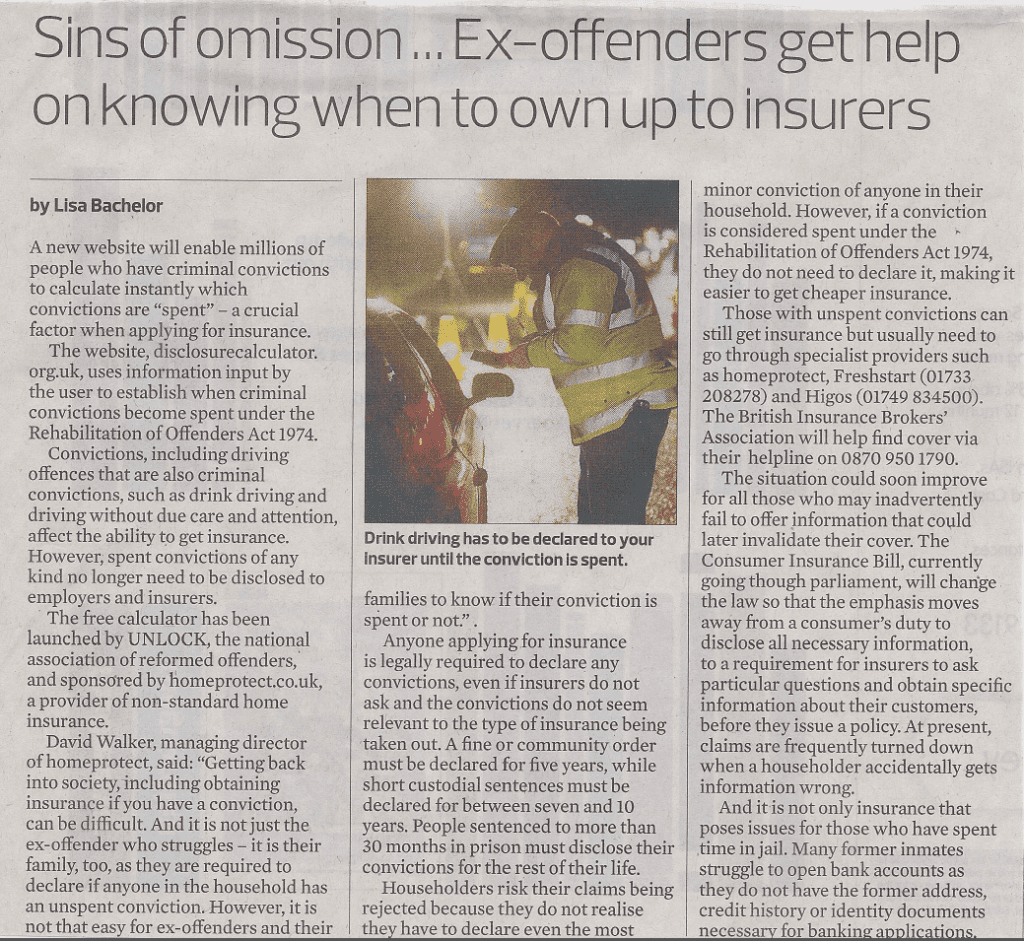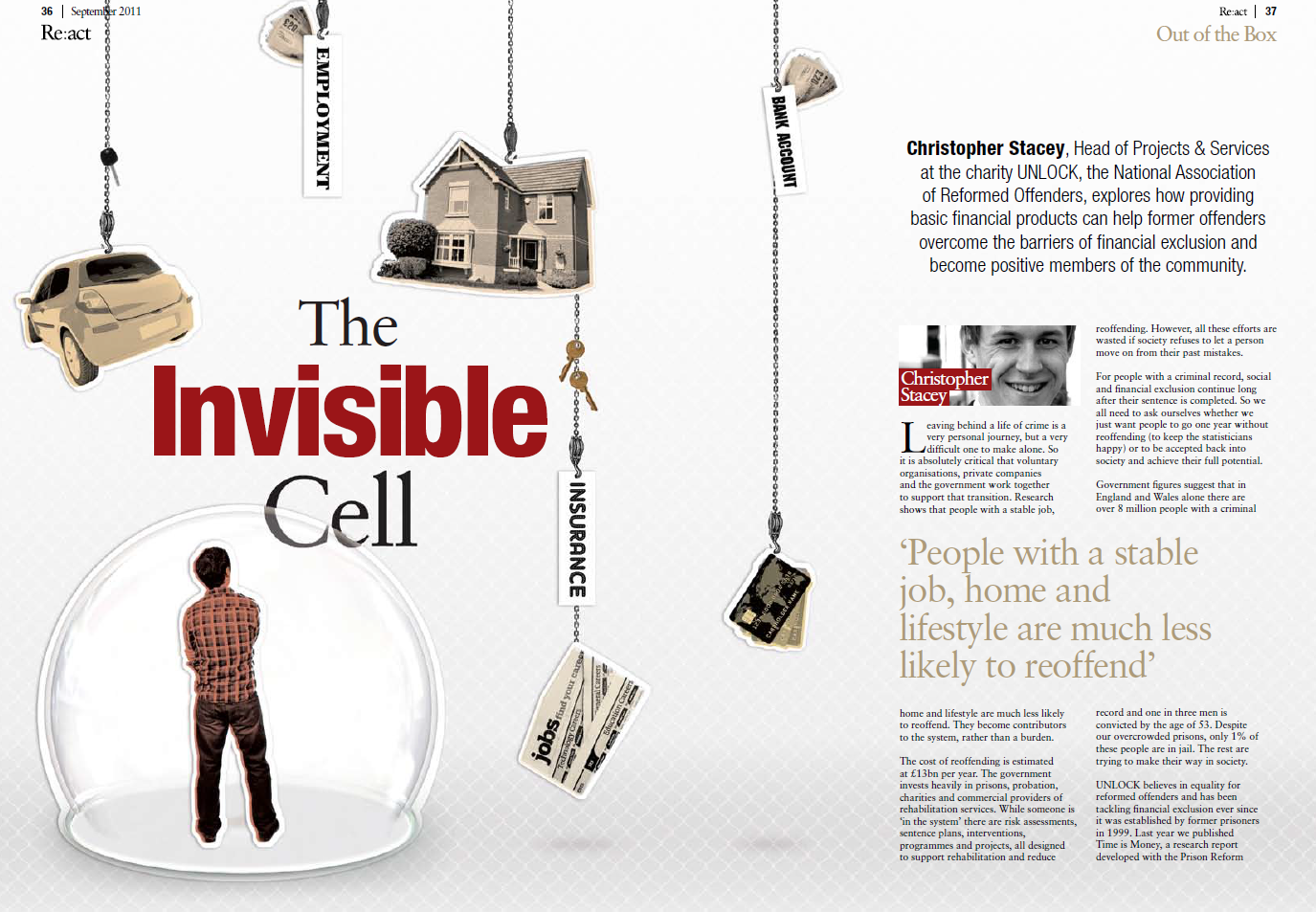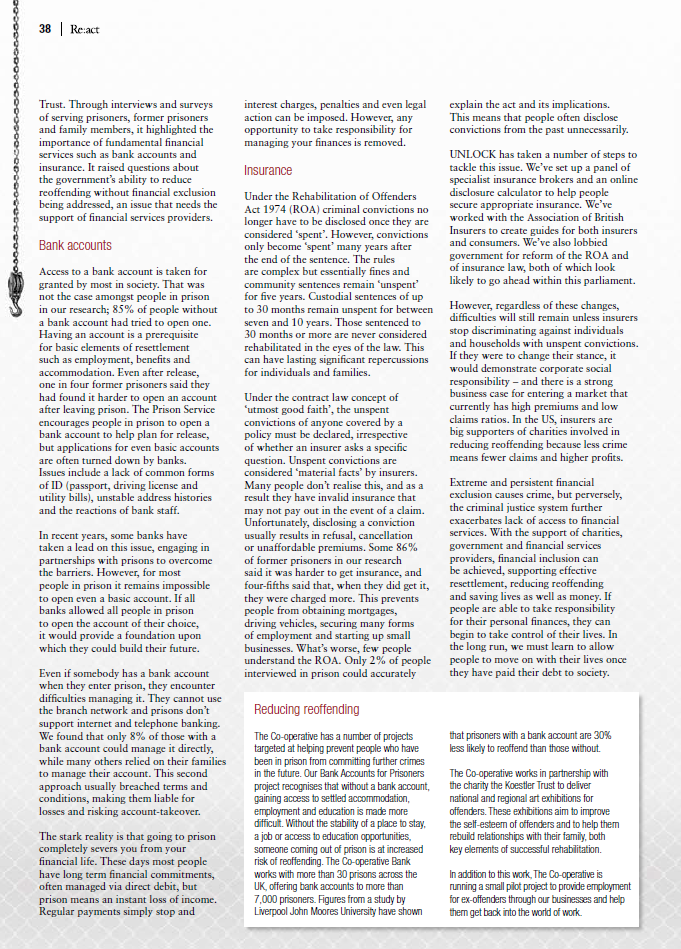The Sunday Times have featured in their Money section a letter from somebody whose son is experiencing difficulties getting insurance. We spoke with the journalist last week, and provided her with some advice, which led to the person eventually finding some cover, and we’re featured in the published response (see below).
Category: For specific groups
Prisoners to get Halifax bank accounts as they prepare for release
We’re featured in an article in the Mail on Sunday, which covers some recent work we’ve done with Halifax bank to extend the number of prisons that they open basic bank accounts for. The article is available to read here.
Sins of Omission – Ex-offenders get help on knowing when to own up to insurers
Calculator to help ex-offenders
As part of the launch of our Disclosure Calculator, we sent out a newswire which was picked up by Media Trust. The article is available here.
Launch of the Disclosure Calculator
This October we took to the House of Lords, armed with one Minister and two Lords, to launch the Unlock Criminal Record Disclosure Calculator. It’s a new online tool to help people determine when their conviction will be ‘spent’.
The Rt Hon Lord McNally – Minister of State for the Ministry of Justice; Lord Navnit Dholakia OBE PC DL; and Unlock President, Lord David Ramsbotham GCB CBE , congregated with Unlock staff, volunteers and members, plus insurers, barristers and more for the highlight of our year.
Opening the meeting, Unlock called for a “right of access to a normal life for reformed offenders” which isn’t currently available under the ROA.
Christopher Stacey of Unlock explained how the calculator can be used to determine when a conviction will become “spent” under the ROA. Stacey said: “Currently the ROA is very complicated, so we need a calculator that’s easy to update in response to any changes. It’s been developed with our members and feedback from various organisations, supported by a grant from Persula Foundation”.
Members echoed the sentiments and welcomed the new calculator: “It’s so simple to use and you don’t have to worry talking to people, where they might judge you on a past offence. You can use it in the comfort of your own home. And it’s free too.” said an Unlock member.
Closing the meeting Lord McNally congratulated the work. His speech is provided below to give you an insight into what the Government has to say about your least favourite law.
Further feedback on the calculator has also been positive with news of its launch sweeping across various online social networks. To use it is simple. You just need to register with an email and some brief personal details such as your DOB, gather and enter information pertaining to your conviction, sentence or disposal received and agree to the terms and conditions.
The calculator is sponsored by online insurance providers homeprotect whose website is at www.homeprotect.co.uk. To find out when your conviction will be spent visit www.disclosurecalculator.org.uk to try it out for yourself.
Speech by Lord McNally
“I would like to congratulate UNLOCK on achieving what some previously considered impossible. The Rehabilitation of Offenders Act is a complex but important piece of legislation that can have a significant impact on many people’s lives. It is crucial therefore that it can be understood. The introduction of the UNLOCK criminal disclosure calculator helps to break down these complexities and through this simple tool, individuals will be able to find out what the ROA and their conviction means to them.
The Government understands that the ROA may be difficult to understand for the lay person and that on occasion, incorrect information is given by individuals who are asked about their criminal record history. This could prevent the ROA from achieving one of its aims of improving access to employment for reformed offenders.
When an employer asks a reformed offender if they have any previous convictions, the reformed offender does not generally want to hide his conviction in an attempt to deceive. Through correspondence with offenders, we know that what they actually want is a fair chance at getting a job and to be honest with their future employer. However, through hearing about yours and others experience this is easier said than done.
Because ordinary citizens might find it difficult to apply the ROA to their particular situation, it is not wholly surprising that some reformed offenders are confused about what they can and can’t conceal. This confusion can result in a reformed offender inadvertently misleading an employer about their criminal record.
In some instances, individuals fail to disclose information that they should because they believe their conviction to be spent when it is in fact not. If and when an employer learns of the conviction, not only are they dealing with a previous offender, but in their mind they are dealing with someone who has lied about their past. It is very difficult for that individual to justify why he failed to reveal his conviction.
Alternatively, through fear of this happening, individuals often reveal information when they don’t have to. They don’t realise that a conviction is spent, or aren’t sure, and so tell their employer and can be penalised for their honesty. Once the information is known, it is very hard for the individual to persuade a prospective employer that it is not relevant because the conviction is spent. We all know it would be hard to forget such information, even if it is completely irrelevant.
Neither situation seems fair, but we know, through working with organisations such as UNLOCK, that both do occur.
This unfairness and confusion is, of course, undesirable. The ROA is designed to improve the chances of ex-offenders finding employment; employment reduces the likelihood of someone being an offender. The benefits of assisting offenders into work are therefore plain to see.
One of the obstacles to achieving this has today been broken down. The launch of UNLOCK’s disclosure calculator helps both individuals and employers to understand when a conviction is spent and so helps the ROA achieve an important aim.
No single act will remove all the barriers faced by an ex-offender seeking to reintegrate into society. One, simple step however is to tackle the prejudices that exist around employing ex-offenders, regardless of whether an individual has a spent conviction or not. We are working to improve employers’ and members of the public’s understanding of criminal records, and why most individuals with convictions a long time in their past should be considered equally with those with no convictions. Guidance being developed and provided by UNLOCK and across Government will go some way towards this.
I hope that the hard work of UNLOCK will continue and that through that work, together we can remove some of the unnecessary obstacles faced by offenders who want to lead normal, law abiding lives. Part of that is improving individual’s understanding of the ROA. I am sure you will all agree with me that the launch of this calculator marks a significant step towards achieving that aim.”
The Invisible Cell – How access to basic financial products can help overcome financial exclusion
The role of the financial services industry in reducing re-offending
Linked to the launch of Time is Money, we’ve written a Think Piece for the Chartered Insurance Institute. You can read the article here.
The impact of CRB checks on people
We discuss on BBC Radio Essex about the problems that CRB checks cause people with convictions, and how the system should be improved. You can listen to the piece below.
Caught fare dodging? How even a minor conviction could have a huge impact on your insurance
Today we were featured in a Daily Mail article which looked at how minor convictions can have a huge impact on your insurance. You can read the article here.
The article was also featured on the thisismoney.co.uk website.
New insurance guidance to help 8 million consumers with past criminal convictions
Unlock has joined up with the Association of British Insurers (ABI) to produce guidance for consumers and insurers on the complex issue of criminal convictions and insurance.
According to government figures, more than 8 million people in England and Wales have a criminal conviction and one in three men are convicted by the age of fifty-three.
Consumers are legally required to declare convictions even if insurers do not ask about them, unless they are considered ‘spent’ under the Rehabilitation of Offenders Act 1974. A fine or community order must be declared for five years, while short custodial sentences must be declared for between seven and ten years. People sentenced to more than thirty months must disclose their convictions for the rest of their life.
The laws apply to anyone covered by a policy, including partners and children on home policies and named drivers on motor policies. If a child receives a fine then their parents must disclose the conviction for 30 months as disclosure periods are shorter for people convicted when under the age of eighteen.
Many insurers take unspent convictions into account when assessing risk. If ‘unspent’ convictions are not disclosed insurers are able to avoid any claims made on the policy.
Unlock’s guidance, which has been sponsored by online insurers homeprotect, highlights consumers’ legal obligations and provides advice on how to buy insurance. The ABI’s guidance covers insurers’ legal obligations and industry best practice, such as including clear questions about convictions to make sure consumers get appropriate cover.
Chris Bath, Director of Projects at Unlock said: “Financial services are a crucial foundation for engagement in modern society. If we want people to lead productive lives; working, paying taxes and providing their family with a home, we cannot allow the justice system to sever people from their finances, even less to create lifelong financial exclusion.”
Nick Starling, the ABI’s Director of General Insurance and Health, said: “Access to, and fair treatment by, financial services providers is a key part of financial inclusion. We recognise that some people with criminal convictions and related offences may encounter difficulties when looking for insurance. We have produced guidance for our members to ensure that people with criminal convictions get a fair deal from insurers. Customers can expect insurers following the guidance to provide clear information about how they use criminal convictions, ask clear and concise questions, and help those to whom they may be unable to insure.”
If you have a press/media enquiry, click here.



